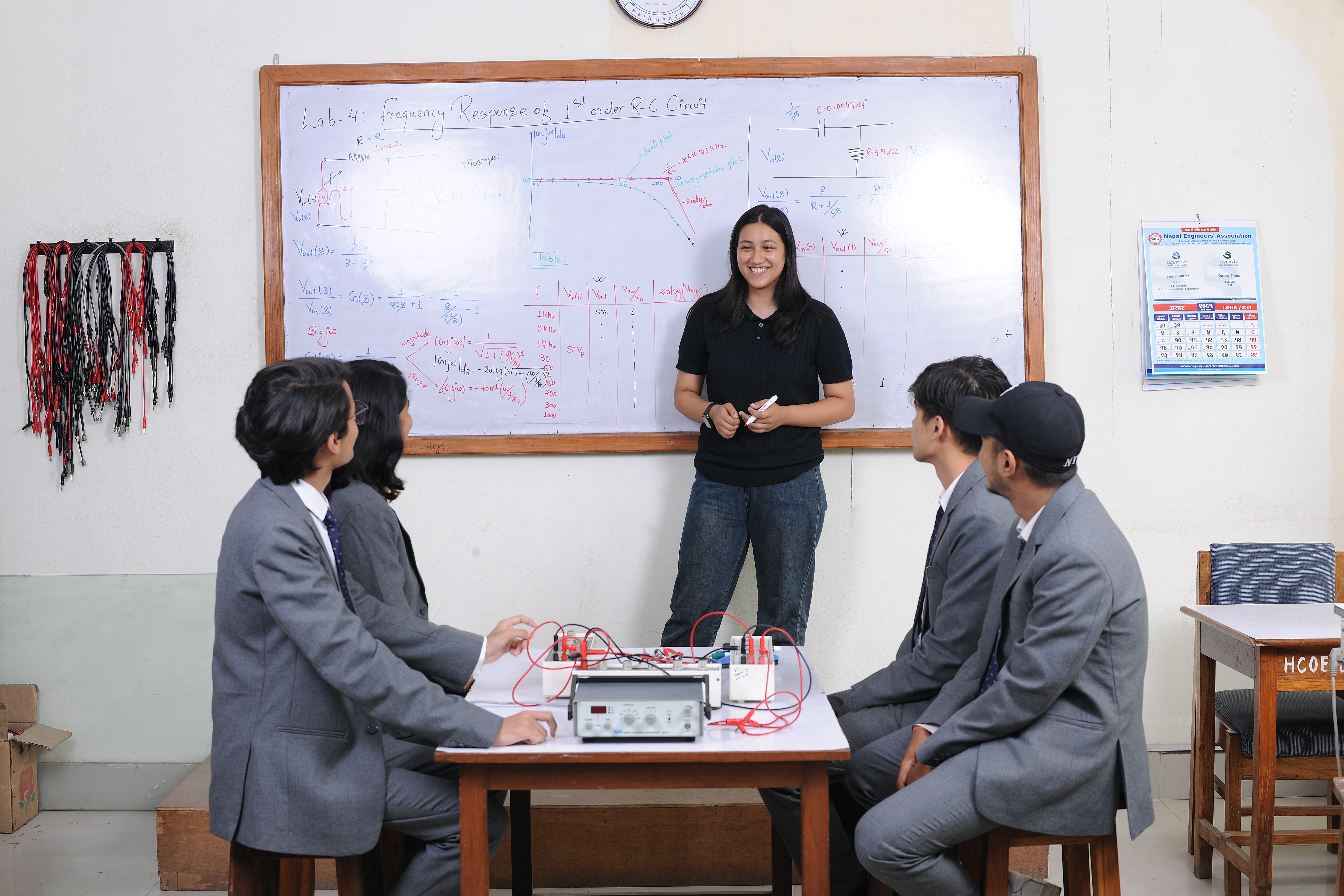Bachelor's degree in Electronics, Communication and Information Engineering is a four-year (eight semesters) program with core and elective subjects accompanied by project works. The proposed courses for this program include: Communication System. RF and Microwave, Antenna and Propagation, Microprocessor, Electronics Device and Circuits, Digital Logics, Artificial Intelligence, Database management System. Operating System. Computer Programming and Object oriented Programming. This course aims to provide the solid foundation necessary for the students to embark on a successful career in Electronics Engineering. Information Systems. Networking. System Administration, Software Development and Multimedia Computing fields. Popular and professional technical training programs are integrated into the major structure. The strong knowledge gained in this major structure prepares graduates for further studies or employment in a wide range of economic sectors like technology, business, banking, finance. and trading in Nepal. Asia and beyond.
The Department assists students to learn these subjects through Lectures, laboratory works and presentations. It also schedules field visits for students in different semester at sites like Radio station, Nepal Telecommunication Company, Satellite Station and Hydro Power Station to ensure the learning by doing. Total intake capacity for this programme at HCOE,TU is 48.
Course Objective
» To produce highly competent professional in the field of Electronics. Communication and Information Engineering
» To Enhance the analytical and problem-solving capability of the students to handle current issues in Electronics, Communication and Information Engineering
» To provide specialized knowledge to the students in Technical aspects of Electronics and Information Engineering and automation
» Develop professional skill in students to make them capable of carrying out sound knowledge in Electronics. Communication and Information engineering
Career prospect
Information Technology is amongst the areas that Nepal Government has identified for focused support to develop it faster in Nepal In each and every sector like banking, finance. business services, trading. legal and public administration sectors people with a solid background in technology are in great demand in this increasingly complex technological age.
Some of the Sectors where Electronics, Communication and Information Engineers can work:
» Consumer Electronics manufacturing companies
» Telecommunication Companies
» Telecom Vendors
» Hospital and Medcal Institutions
» ISPs
» Civil Aviation
» Hardware Design and production Industries
» Software Companies
» Academic Intuitions
» Government Offices
» ICT Industries

|
Er. Ashok GM
Head of Department (Electronics and Computer Department)/Associate Professor, Department of Electronics and Computer Engineering Master in Information System Engineering |

|
Er. Devendra Kathayat
Deputy Head of Department (Electronics and Computer Department)/Associate Professor, Department of Electronics and Computer Engineering MSc. in Information & Communication Engineering |

|
Dr. Shanti Subedi
Research and Innovation Department Head, Senior Lecturer, Bachelor in Civil Engineering Phd |

|
Er. Himal Chand Thapa
Head of Department (Computer Science and Information Technology)/Senior Lecturer, Bachelor in Computer Science and Information Technology MSc. Computer System and Knowledge Engineering |

|
Er. Suvarna Singh Raut
Deputy Head of Department(Civil Engineering)/Senior Lecturer, Department of Civil Engineering Master’s Degree in Geotechnical Engineering |

|
Mr. Tanka Prasad Khanal
Exam Chief/Senior Lecturer, Faculty of Science and Humanities MSc. in Physics |

|
Er. Narayan Adhikari Chhetri
Senior Lecturer/Major Project Coordinator, Department of Electronics and Computer Engineering BE Electronics and Communication |

|
Mr. Hari Prasad Bhattarai
Senior Lecturer, Faculty of Science and Humanities Masters in Mathematics |

|
Er. Ramesh Tamang
Senior Lecturer/Minor Project Coordinator, Department of Electronics and Computer Engineering Masters of Engineering (ME) in Computer Engineering |

|
Mrs. Pratigya K.C. Karki
Senior Lecturer, Faculty of Science and Humanities MSc. in Chemistry |

|
Er. Ijhar Khan
Senior Lecturer, Department of Electronics and Computer Engineering MSc. Electrical Engineering |

|
Mr.Prabeen Kumar Awasthi
Senior Lecturer, Faculty of Science and Humanities Master's in English Literature(2016) M.Phil. in English Literature(2018) |

|
Er. Shiva Raj Luitel
Senior Lecturer/Electrical and Electronics Lab Coordinator, Department of Electronics and Computer Engineering MSc. Information System Engineering |

|
Er. Hasina Shakya
Senior Lecturer, Department of Electronics and Computer Engineering MSc. Computer Science |

|
Er. Kobid Karkee
Senior Lecturer, Department of Electronics and Computer Engineering MSc Information and Communication Engineering |

|
Mr. Sabindra Giri
Lecturer, Faculty of Science and Humanities MSc. in Mathematics |

|
Er. Bibek Adhikari
Lecturer, Department of Electronics and Computer Engineering MSc in Mechanical System Design Engineering |

|
Er. Rajesh Raskoti
Assistant Lecturer, Department of Electronics and Computer Engineering Master in Informatics and Intelligence System (running) |

|
Er. Krishnanand Badu
Assistant Lecturer/ Computer Lab Coordinator, Department of Electronics and Computer Engineering BE in Computer Engineering |

|
Er. Sushant Pandey
Assistant Lecturer, Department of Electronics and Computer Engineering BE in Electronics, Communication and Information Engineering |

|
Ms. Surakshya Dhakal
Assistant Lecturer, Faculty of Science and Humanities MSc. in Statistics (TU) |

|
Subarna Maharjan
Teaching Assistant, Department of Electronics and Computer Engineering BE in Computer Engineering |

|
Shiv Shankar Sah
Assistant Lecturer, Department of Electronics and Computer Engineering BE Electronics |

|
Jagat Bohara
Lab Assistant, programs.Computer & Electronics Diploma |
Below is Subject listing for Bachelor's degree in Electronics, Communication and Information Engineering
First Year/ First Part
| Subject Code | Subject Title |
|---|---|
| SH 101 | Engineering Mathematics I |
| CT 101 | Computer Programming |
| ME 101 | Engineering Drawing I |
| SH 102 | Engineering Physics |
| ME 106 | Digital Logic |
| EX 101 | Fundamental of Electrical and Electronics Engineering |
First Year/ Second Part
| Subject Code | Subject Title |
|---|---|
| SH 151 | Engineering Mathematics II |
| CT 151 | Object Oriented Programming |
| EX 151 | Electronic Device and Circuits |
| SH 153 | Engineering Chemistry |
| EE 154 | Electric Circuits and Machines |
| EX 152 | Digital Logic |
Second Year/ First Part
| Subject Code | Subject Title |
|---|---|
| SH201 | Engineering Mathematics III |
| SH204 | Communication English |
| CT201 | Computer Graphics and Visualization |
| EX201 | Microprocessor |
| EX202 | Advanced Electronics |
| EX204 | Control System |
Second Year/ Second Part
| Subject Code | Subject Title |
|---|---|
| SH252 | Probability and Statistics |
| CT251 | Discrete Structure and Algorithm |
| EX 252 | Instrumentation |
| EX253 | Computer Organization & Architecture |
| EX 254 | Electromagnetics |
| EX255 | Signals and Systems |
Third Year/ First Part
| Subject Code | Subject Title |
|---|---|
| SH 301 | Numerical Methods |
| CT 305 | Artificial Intelligence |
| EX 301 | Filter Design |
| EX 302 | Embedded Systems |
| EX 303 | Propogation and Antennna |
| CT 325 | Elective I |
Third Year/ Second Part
| Subject Code | Subject Title |
|---|---|
| CT 355 | ICT Project Management |
| CE 356 | Engineering Economics |
| EX 351 | Communication Systems |
| EX352 | Telecommunication and Computer Networks |
| EX 353 | Minor Project |
| CT 385 | Elective II |
Fourth Year/ First Part
| Subject Code | Subject Title |
|---|---|
| EX 411 | RF and Microwave Engineering |
| EX412 | Robotics |
| EX413 | Digital Signal Processing |
| EX435 | Elective III |
| EX414 | Project I |
| EX 415 | Wireless Communication |
Fourth Year/ Second Part
| Subject Code | Subject Title |
|---|---|
| EX463 | Energy Environment & Social Engineering |
| EX462 | Internship** |
| EX 465 | Elective IV |
| EX 461 | Project II |

